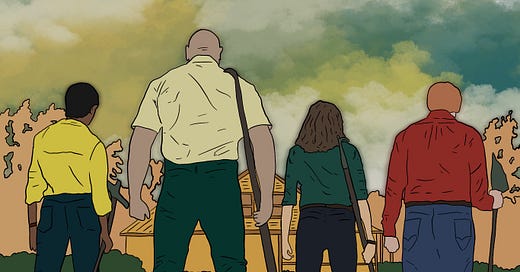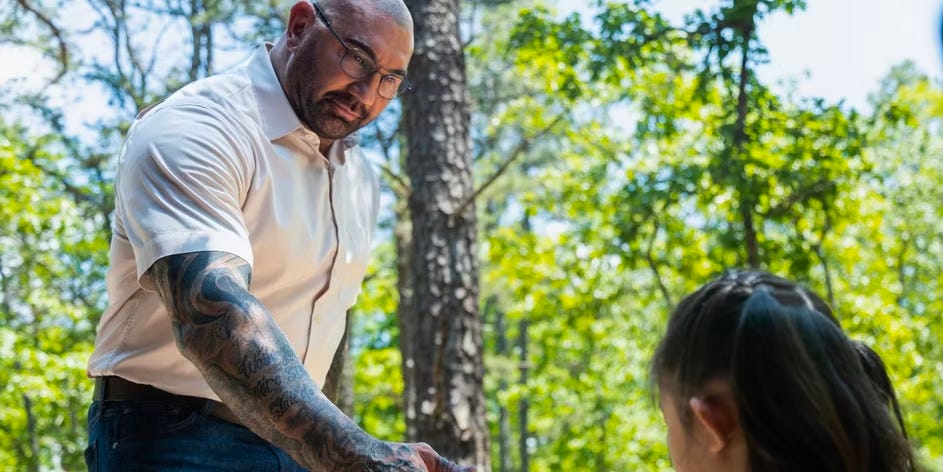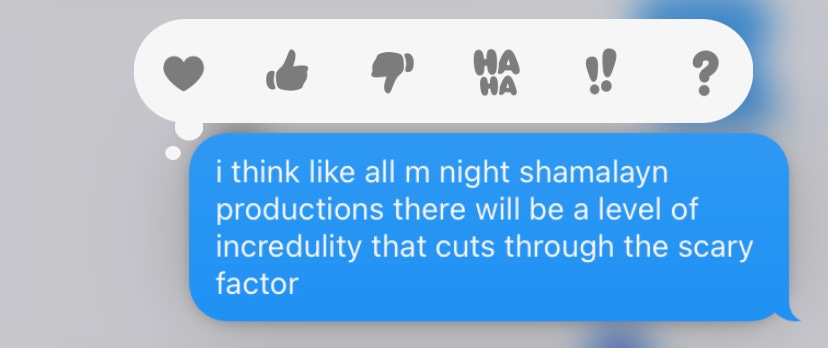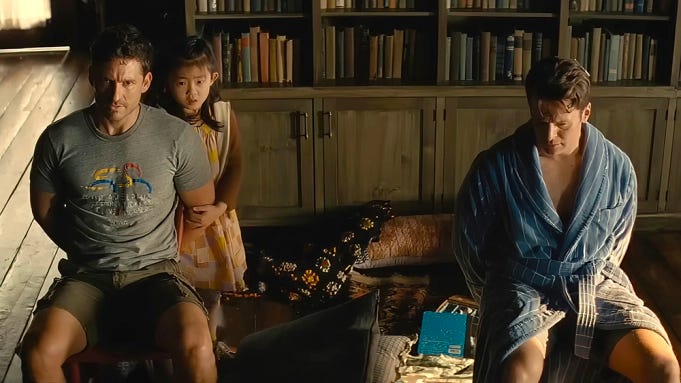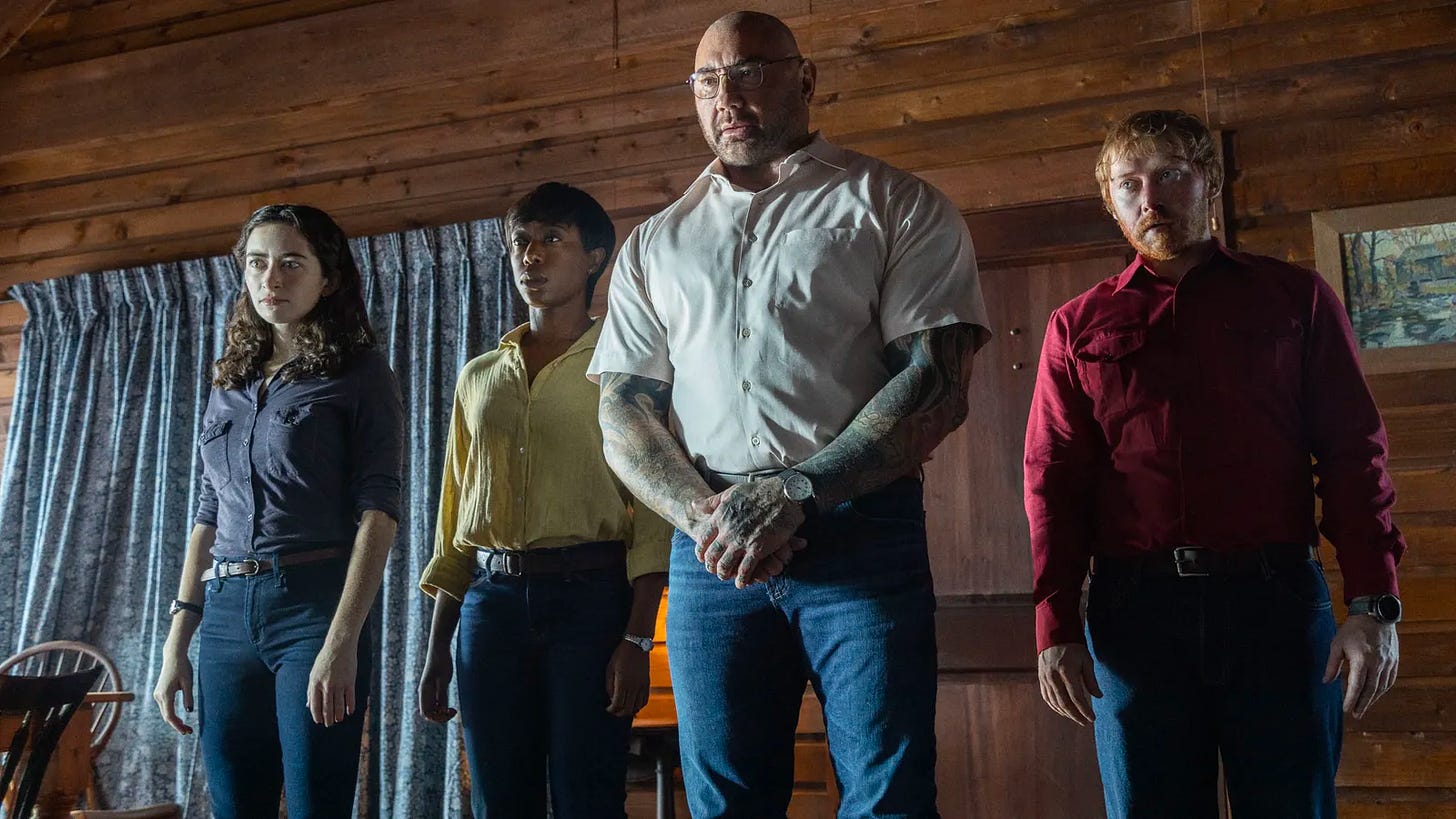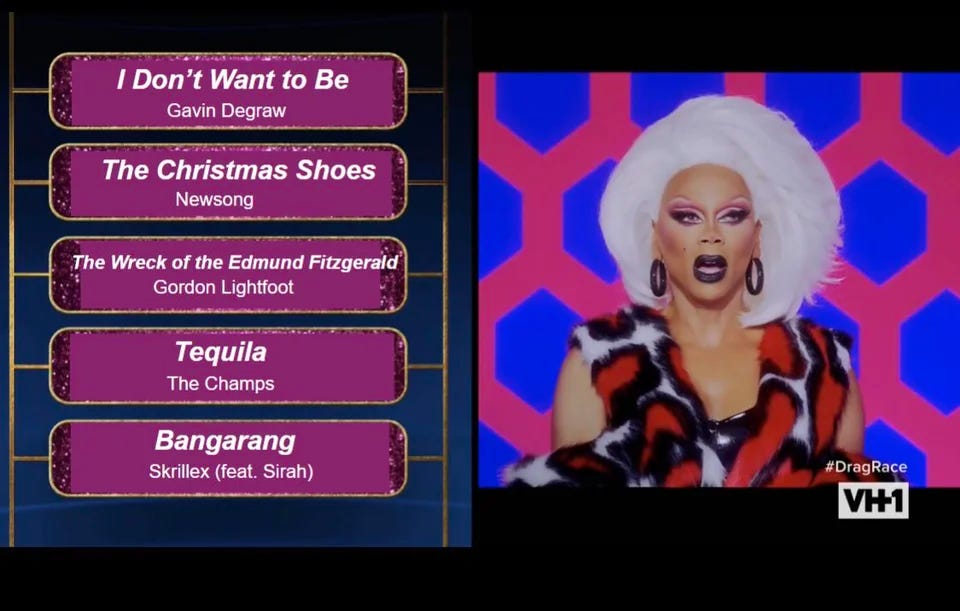'Knock at the Cabin' Review: Listening to ‘Boogie Shoes’ At the End of the World
Please kill me! No, please kill me!
Look over here! Remember to check out The Elephant in the Werkroom after this review for my thoughts on the most recent episode of Drag Race.
The Yearning Rating: ✰✰✰
Romance ✰✰✰
Sex
Storytelling ✰✰ ½
Performance ✰✰✰
Yearning ✰✰✰
Spoilers ahead for M. Night Shyamalan’s Knock At The Cabin.
Written by Meg Heim
Take a walk down memory lane with me…all the way back to the summer of 2006. I’m enrolled, against my will, in Vacation Bible School (sorry Mom). If you’re not familiar, VBS (as Lucy Dacus calls it) is kind of what it sounds like—a Christian day camp featuring religious education, arts and crafts, music, and various programming, likely run by your local Methodist church. When reflecting on M. Night Shyamalan’s newest home invasion thriller, Knock at the Cabin, a VBS classic, “He’s Got The Whole World In His Hands” comes to mind:
He’s got the whole world in His hands
He’s got the whole wide world in His hands
He’s got the wind and the rain in His hands
He’s got the little bitty baby in His Hands
He’s got the whole world in His hands
Having the whole wide world in their hands is certainly the fate that befalls Eric and Andrew, two gay dads vacationing at a remote cabin in the woods with their adopted daughter, Wen, when an ominous quartet of uninvited visitors break in and claim that a total worldly apocalypse is imminent. They present the family with a choice: choose one member to sacrifice, and save the rest of the world from death and destruction. Or refuse, and bring about a slew of world-ending plagues and natural disasters that would result in the end of humanity.
‘Daddy Eric’ (Jonathan Groff) and ‘Daddy Andrew' (Ben Aldridge—who you may remember from Spoiler Alert) play a very sanitized, well-off and in love queer couple who from the outset have all the markers of a happy family life. Their precocious daughter, Wen, is out catching grasshoppers in the front yard when a massive, eerily calm stranger approaches her. He introduces himself to her as Leonard (Dave Bautista), and from the jump is possessed with an alarming, captivating serenity. He tells her genuinely (we really believe it) that he hopes they can be friends, and that he regrets what is yet to come for her and her dads.
After Leonard and his three associates have taken Wen’s dads hostage, and laid the frightening, medieval-looking weapons they’ve been brandishing down, we learn that the four of them were all brought together by the same mysterious, apocalyptic visions, which eventually compelled them to congregate here and fulfill the destiny of bringing a horrible choice upon this family. When first given the opportunity to choose a sacrifice, Eric and Andrew adamantly refuse, and the group—who we are coming to understand each represent a specific harbinger of the impending apocalypse—violently murder one of the four (I won't spoil who, but I had this poster of them in my locker in the 7th grade). Leonard then turns on the TV to show news coverage of devastating earthquakes and tsunamis; the apocalypse has begun.
The movie basically continues like this: each time Eric and Andrew refuse to sacrifice a member of their family for the good of mankind, another Horseman must die in order to advance the apocalypse towards its final conclusion. (Four Horsemen of the Apocalypse = four chances to save the world). But, like I texted my friend Nia on the way to the theater:
This is sort of my thesis statement! We all know Shyamalan’s style and why it's so fun to watch—funny games, psychological horror, and unexpected twists1. Even if it's not good good, it’s fun. There’s a vaguely Christian end-time message encased in some conservative, modern Doomsday trappings in Knock at the Cabin. Leonard and his affiliates found each other on a message board, something that Andrew—a human rights attorney—immediately flags as evidence that this is a hate crime, not an apocalypse. M. Night (can I call you M. Night?) can rarely resist walking this line—is his horror rooted in socio-political motivation, or is this just a magical beach that makes people old? Wait, I’m getting off track.
While Andrew and Eric are scared, tied up and afraid for their lives, the four messengers walk a hilarious line of being violent murderers but also frantically anxious. Adrienne (Abby Quinn), who introduces herself with all the timidness of someone at their first AA meeting, explains that she is a line cook from Dupont Circle, D.C. and, in response to Andrew’s furious claims that this is a targeted attack against a queer family, says: “We don’t hate anybody. We don’t have a homophobic bone in our bodies!” This coming after the groups participation in a violent bludgeoning is comedic relief that I believe Shymalan genuinely didn’t intend. His signature unsubtle bluntness when writing dialogue paired with suspenseful and creative horror sequences is part of what makes his directorial style undeniably distinctive. (See: my favorite scene from The Visit when the evil Grandma crawl-gallops under the house during a game of Hide and Seek.)
As the movie progresses, we start to see some division grow between the husbands, as Andrew grows more and more maniacally irate with the Horsemen and Eric begins to wonder if the apocalypse is actually happening. Being that they are tied up, the only proof Leonard can give them comes from turning on the massive wall-mounted flatscreen to the news, which highlights impressively scary doomsday images such as planes falling from the sky and back to back earthquakes. Sadly, the closest this movie gets to examining the main characters’ queerness is with a flashback to the hate crime that Andrew experienced. This ends up contributing to the vaguely conservative tone, as we see him recover from that in a Rocky Balboa-esque boxing gym and by purchasing a gun for self defense2.
While the couple has both great partnership and parenting chemistry on screen, the movie is only able to gesture at whether or not the queerness of the family structure is actually relevant. Jonathan Groff is in his twunk3 era and genuinely surprised me with being able to carry off an anxious, loving, possibly radicalized dad vibe. Ben Aldridge also gives a great performance; the couple has a nerdy and sweet dynamic that is charming and believable. Every M. Night Shyamalan movie has to have a character willing to fly completely off the handle, and Aldridge bravely takes this on. Their daughter, Wen—played by the 9 year old Kristen Cui—stars in the first 15 minutes then largely plays a convincingly scared daughter, burying her face in her dads’ necks.
Through additional flashbacks, we see a religiosity component carried through, as the couple sit in the lobby of the adoption agency and Andrew somewhat dismissively tells Eric that he won’t laugh if he wants to get a quick prayer in. Despite Leonard and his friends insisting that they are not religious fanatics, their low waisted, belted skinny jeans and tidy button-downs are giving cult (to me).
Knock at the Cabin’s best twist is Bautista, because he could easily have been typecast into a role that his body—huge, imposing, and heavily tattooed—predisposes him to4, i.e. someone who was as “dangerous as he looked”. Instead, Leonard defies that cinematic stereotype by playing a thoughtful and exceedingly patient gentle giant, determined to provide the necessary guidance Eric and Andrew need to save the world (lol), even as he assists in the violent murders of his fellow Horsemen. As time is running out, he maintains an almost parental level of care for the family.
Knock at the Cabin represents M. Night Shyamalan’s second book-to-film adaptation (the first being his 2021 film, Old) and this may prove to be a successful creative strategy for him. It's based on the award-winning 2018 horror novel, “The Cabin at the End of the World” by Paul G. Tremblay, but it doesn’t feel like an adaptation. Shyamalan successfully builds an engaging, standalone world for this story. And while it’s worth mentioning that the source material for the movie also centers on a queer couple—so Andrew and Eric are not necessarily a performative bid on behalf of the production company for more representation—Knock at the Cabin isn't able to really carry this much further.
The film is another example of media we have to consider on proverbial X and Y axes: with X being a genuinely queer story, and Y being a story that just features queer characters. To that effect, I felt that the most yearning present in this film actually comes from the 4 Horsemen. Their collective performance is a simultaneously comedic and unsettling display of desperation—they want so badly to fulfill their destinies, save the world and be free from their terrifying visions. “I can’t get his screams out of my head…I’m holding him and he’s just burning, burning…” Adrienne pleads. (A plague of fire was never explicitly mentioned, so I guess this line was included to up the emotional ante.)
It takes most of the 100 minutes of the film for Eric and Andrew to decide whether or not they will act. Knock at the Cabin is highly watchable and never boring; it is well constructed and shot in an appealing way that I think we can reasonably expect from Shyamalan’s work. The end of the film calls back to an opening sequence where Eric, Andrew and Wen are grooving and singing along to “Boogie Shoes” in the car, the picture of idyllic modern family life. (Jonathan Groff obviously gives us some nice upper harmonies). In the apocalyptic aftermath, our weathered and beaten-down survivors happen upon the song on the radio, amidst news reports, and listen to it in painful silence. A very M. Night Shyamalan ending.
Different options for watching Knock at the Cabin can be found here.
If you enjoyed reading this, feel free to click the little ♥ button on this post so that more readers can discover us on Substack :)
The Elephant in the Werkroom
Episode 8:
A Lip Sync LaLaPaRuza? Already?? Jk I’m fine with it (they’re so fun to watch).
I’ve quietly been a Marcia Marcia Marcia stan! (I watched a lot of Brady Bunch growing up.) I was so happy to see her kill it. She’s a good performer. Does anybody else think it's weird that this is the one time in the history of Drag Race that RuPaul isn’t drooling over a girl because she’s just plain pretty? Valentina, I’m looking at you…
I am kicking myself for, once again, failing to stick with my instincts. I had Aura Mayari as my elimination pick for weeks, but when she won the main challenge in Episode 6, scooched her out of my last place spot (Yes, I’m in the same bracket as Ali) all for her to then immediately get eliminated like I knew she deserved. I’ve been playing a similar game with Jax—I could tell that Ru was just not that invested in her as a potential winner. But she’s a strong lip syncer, so when the LaLaPaRuza was announced, I assumed she’d hang on for one more episode. But after Anetra pardoned Spice, I knew I was in trouble once more. Both gave solid performances, but the queen that needed to move forward is the one that did.
Anetra and Sasha Colby are, unsurprisingly, astonishing in their lip sync duel of Fifth Harmony’s “Ready”. It’s exciting to see a relatively young/unknown queen hold her own against such a legend! You really get the sense that Anetra knows what it takes to win this competition and has prepared for it (refreshing).
Spice is this season’s loveable ditz. Regardless of her talent, she is likable and kind. During this ep she insists that she is about to enter her top era–we shall see!
Let’s party (or cry?) like it’s 1999! Next week on The Yearning, Ali will review Goran Stolevski’s Of An Age.
This is perhaps generous
Sigh…
Twink/Hunk
To illustrate this, Bautista plays a gun-toting meninist-bordering-incel in Glass Onion, a movie that is much more “critically acclaimed” than Knock at the Cabin


